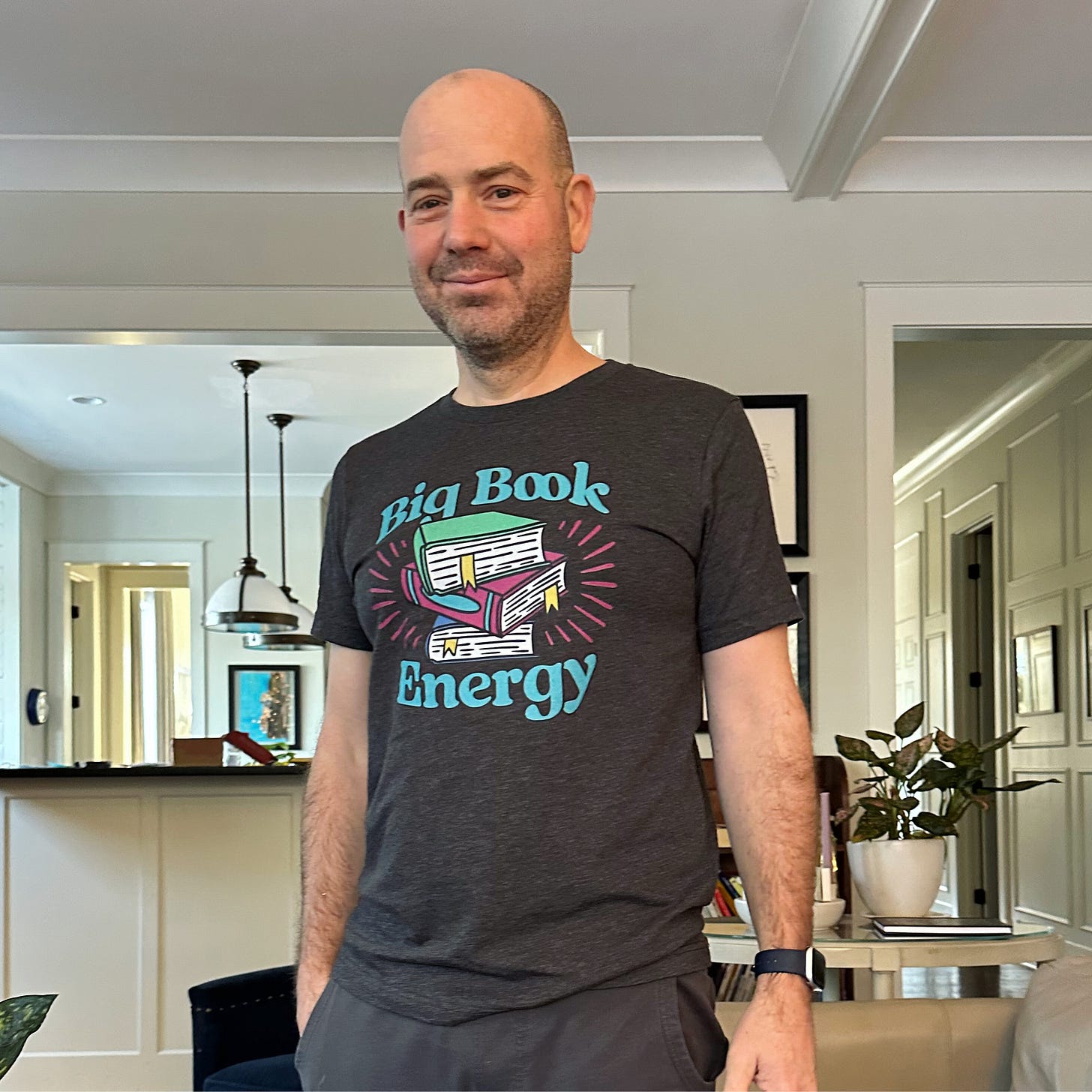Bookish Diversions: Read a Book, Live Forever
Or at Least Longer than Nonreaders, Plus: New Year’s Reading Goals, Reading Apps, More
¶ Reading has many documented therapeutic benefits. We’ve covered a few here already, especially the boost books lend memory. Regular reading, according to neuroscientist Mithu Storoni, “can give you the thinking skills of someone 13 years younger.” Just as impressive, readers don’t merely live more cognitively rich years—they also live longer.

In one twelve-year study, Yale researchers tracked the reading habits of three groups: those who read more than three and half hours a week, those who read fewer than three and half hours a week, and people who never cracked open a book at all. “Researchers consistently found that both groups of readers lived longer than the non-readers,” according to a summary of the findings at Big Think. After controlling for health, wealth, education, and gender, researchers found, “The readers who read over 3.5 hours a week lived a full 23 months longer than the people who didn’t read at all.”
The effect is noticeable after just a few years of the practice, though only for books—not ephemeral material such as magazines and newspapers. Storoni’s research found cognitive gains from all reading material, but the Yale study indicates life-extension only comes from cognitively and emotionally demanding literature alone. This contradiction probably warrants more research since the mechanism seems to be the same: giving the brain a regular workout.
¶ Books help you age well in terms of both mental sharpness and calendar years. These findings marry well with a research-backed suggestion from Arthur Brooks—part of his seven habits that encourage happiness as we age. “Keep learning,” he says.
More education leads to a more active mind in old age, and that means a longer, happier life. That doesn’t mean that you need to go to Harvard; you simply need to engage in lifelong, purposive learning. For example, that can mean reading serious nonfiction as part of a routine to learn more about new subjects.
You can read more about Brooks’s seven habits at the Atlantic or his book From Strength to Strength, which I reviewed a few month back.
¶ Memory, acuity, longevity, joy! Given the many positive benefits of reading, should you set a reading goal? Maybe, maybe not. I regularly read to my heart’s content, so I rarely if ever set a reading goal; the only reason to set a goal is to alter behavior in a positive way. But I did set a reading goal this year. I explain why and how here and then explain here what that means for you in our reading community in 2023.
¶ No screens, just pages. Late in 2021, Vanity Fair writer Nancy Jo Sales realized she’d read only five books for the year; in 2020, it was just eight—both abysmally low numbers. “If you had told me 20 years ago that I would one day stop reading books, I would have said you were crazy,” she said. “I’ve always been a reader; from the time I was little, I would hide away somewhere with a book and devour it, often in one sitting.” The problem? Her phone.
Reading is a marginal activity—that is, we usually read at the top and bottom of the day, or wherever we can find a gap between other activities. But many of us have stopped reaching for a book in those spare moments. Instead, we reach for our “oblong,” as the android Klara calls our mobile devices in Kazuo Ishiguro’s Klara and the Sun. For 2022, Sales decided to change that.
I set a rule for myself that I couldn’t get out of bed and start my day until I had read 20 pages, and I couldn’t go to sleep at night until I had read another 20—so 40 pages in all, every day.
That would add up to nearly 15,000 pages, which—divided by about 300 pages per book—would add up to about 50 books.
She found it challenging at first. She was out of practice, and diving headlong into immersive reading demanded concentration and effort—far more than clicking and scrolling away the minutes. “It was troubling to me,” she said. But she found sticking with it made the difference. “You can fix your distracted brain. You can return it to its more receptive, focused state—how you remember it being from before the days of mobile phones. And you can do this by reading.” In the end, Sales finished forty-six books. This year she’s going for sixty.
¶ Let’s say you do set a reading goal this year. How will you track it? TechCrunch recently listed a handful of apps for readers that can help—and possibly enrich your reading in other ways.
¶ Not so fast. Book reviewer Max Liu is more skeptical of reading goals. He emphasizes reading for pleasure and rejects the programmatic feel of setting targets, especially the way they tend to focus on quantity over quality. “You can set an annual reading target on Goodreads and elsewhere,” he says, “but it can then become tempting to prioritise reading shorter books, or reading more quickly, so you reach your target.” The problem, he notes, is we tend to get out of books the effort we put in. Jetting through a book can undermine its potential effect on us. “Reading is never about quantity and always about the quality of time you spend with a text.”
¶ Susie Mesure has discovered the joy—and occasional frustration—of reading slowly. Her inspiration? Chinese-American novelist Yiyun Li, who refuses to race through a book. “People often say they devoured a book in one sitting,” says Li. “But I want to savour a book, which means I give myself just 10 pages a day of any book.” Instead, Li reads several books at once, prolonging the effect of each. Mesure reports on her attempts at the same.
¶ I saw this prompt on Twitter: “Without downloading any new pics, what's your energy going into 2023?” I thought I’d share my response below.

What kind of energy are you bringing to 2023? And what are your reading plans if any?
Thanks for reading! If you enjoyed these bookish diversions, please share them with a friend.
More remarkable reading is on its way, including a new review this weekend. Don’t miss out. Subscribe.


First, A reasonable goal. Will attack 2 larger books, my main and bonus reads a month with podcast and then try to go with a few books of a new author. My devotional & bible is morning time for me. Yes, the podcasts are so plentiful on the subject of books. That mostly fills up my time on the oblong. I will need to eject myself from so many. I am not an e-reader, but audible is okay. This article is a good one. Great insight. Thank you.
Years ago, I would read on average a book a week. But that number has dropped over the years due to the “oblong”, and I’ve also recognized this pattern. Books have always been my best friend, and I’ve got a stack pulled from my shelves and ready to go. I’ve also deleted all social media apps from my phone, so I don’t feel the need to check in. I am shifting back into the quiet energy I love--energy that gives me the space to create and to learn. I actually just wrote about that in my last substack post.